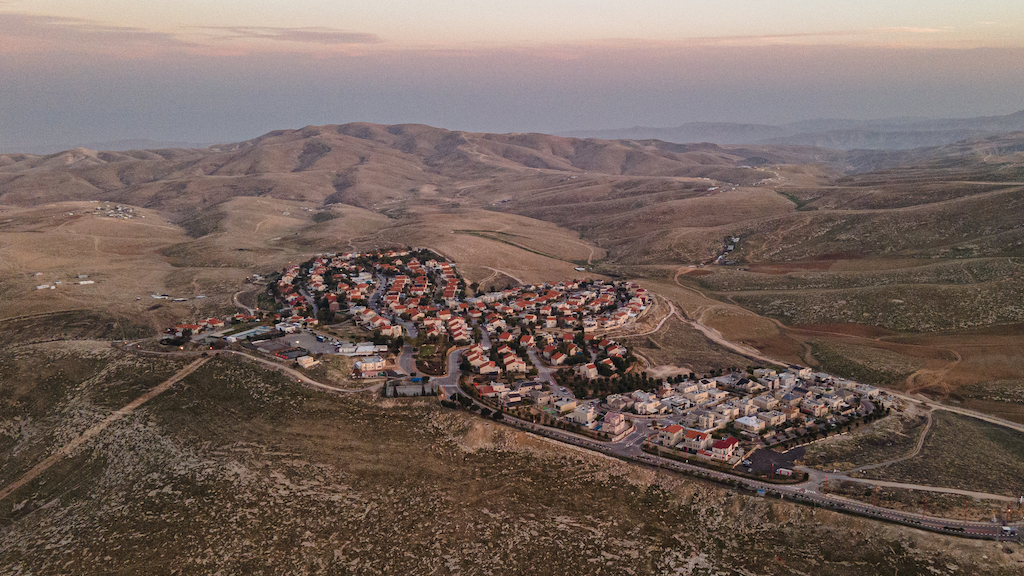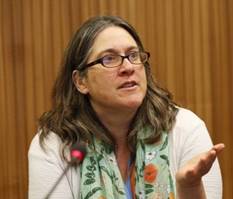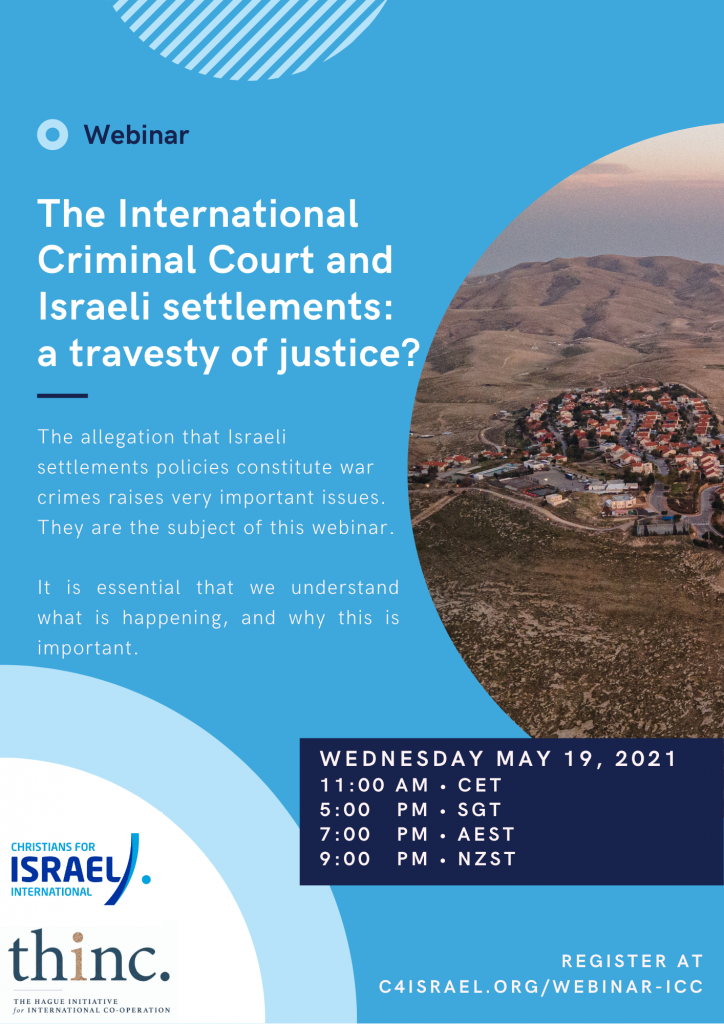Webinar: ICC & Israeli Settlements – watch now
The International Criminal Court and Israeli settlements: a travesty of justice?
The International Criminal Court (ICC) claims that by enabling Jews to live in East Jerusalem, Israel is committing war crimes.
The current situation in Sheikh Jarrah is an example of such claims. Many argue that East Jerusalem is illegally occupied territory, and that by “evicting” Palestinian families from their houses, Israel is committing war crimes.
The ICC recently decided to investigate “war crimes committed in the territory of Palestine”. There are two kinds of war crimes it will investigate: (a) crimes concerning the use of force by Israeli and Hamas forces during Gaza conflicts since 2014; and (b) Israel’s “settlements policies” in Jerusalem and the West Bank.
The allegation that Israeli settlements policies constitute war crimes raises immensely important issues.
Agenda
- Opening – Rev. Cornelis Kant, Christians for Israel International
- Video presentation: what is a “settlement” – Johannes Gerloff
- What is the status of East Jerusalem under international law? – Andrew Tucker, thinc.
- Why does the ICC claim that Israel’s Jerusalem policies are war crimes? – Anne Herzberg (NGO Monitor)
- Why are these issues relevant for Australia and other countries in the region? – Dr. Bren Carlill (Zionist Federation of Australia)
- Q&A
This webinar took place on 19 May 2021:
11:00 AM • CET
5:00 PM • SGT
7:00 PM • AEST
9:00 PM • NZST
Speakers
Anne Herzberg – Legal Advisor of NGO Monitor
Anne Herzberg is a graduate of Oberlin College and Columbia University Law School. Prior to joining NGO Monitor, she worked as an attorney in New York. Her areas of research include business and human rights, international human rights law, the laws of armed conflict, universal jurisdiction, international fact-finding, NGOs, and the UN. As NGO Monitor’s UN ECOSOC designated representative, she frequently participates in UN conferences and appears before UN bodies.
Dr. Bren Carlill – Director of Public Affairs at The Zionist Federation of Australia:
Dr. Bren Carlill has spent over 20 years professionally or academically focused on the Israeli–Palestinian dispute, including living in Israel for several years. He has also worked in Australia’s Department of Foreign Affairs and Trade, and the Department of Home Affairs, where he focused on the civil and human rights conditions and the security situations of various Middle East and South Asian countries. His latest book, The Challenges of Resolving the Israeli–Palestinian Dispute: An impossible peace? was published in January 2021.
Andrew Tucker – Director of The Hague Initiative for International Cooperation:
He is the co-author of the book Israel on Trial.
Rev. Cornelis Kant – Executive Director Christians for Israel International
Jewish communities have been living in the Old City of Jerusalem and the territory known as Judea and Samaria for millennia, alongside the Arab population. Jewish settlement here was restricted by the British during the Mandate period (1922-1948). When Jordan (through illegal use of aggression) took control of these territories in 1948 and named them “the West Bank of the Kingdom of Jordan”, they physically removed all Jews, and destroyed the Jewish synagogues and sacred spaces.
After Israel took control of these territories in the Six Day War in June 1967, many Jews wished to live in the Old City and in Judea and Samaria. Some Jews (such as in Gush Etzion) took possession of properties owned by their forefathers who had been murdered and their houses destroyed by the Jordanians. Others wished to live in parts of Judea and Samaria of Biblical and historical significance.
Since the 1970’s, Israel has facilitated the building of larger settlement blocs, such as Ma’ale Adumim and Ariel. The methods used to do so have been controversial, and these settlement blocs have met strong international condemnation.
Settlements are a subject of Israeli-PLO permanent status negotiations under the Oslo Accords.
Investigating and prosecuting Israeli leaders for enabling these settlements raises many important issues.
- On what basis has the Court decided that these territories do not belong to Israel?
- Why is the Court focusing on Israeli settlements, and not (for example) settlements established by Morocco in Western Sahara, Turkey in Northern Cyprus or Russia in Ukraine?
- Can sensitive historical, religious and political issues be dealt with adequately by a criminal court?
- Have Jews been forced to live in these territories? If so, will the court distinguish between Jews who have been forced to live in these territories, and others who have gone to live there voluntarily?
- Doesn’t this amount to a prohibition on Jews living in what they consider to be their ancestral homeland?
It is essential that we understand what is happening, and why this is important.








